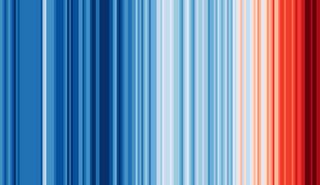University Of Reading Climate Stripes Show Past Year’s Intense Warming
The world experienced yet another year of intense warming in 2022, an updated image of the University of Reading’s climate stripes shows.
The stripes represent the average annual global temperature since 1850, using reds for hotter years and blues for cooler years to clearly show how temperatures have risen dramatically due to human-caused climate change.
Using the Met Office global temperature dataset, an additional line has now been added to the striking graphic to indicate a significant rise in warming in temperature in 2022.
Stripes inventor Professor Ed Hawkins (National Centre for Atmospheric Science, University of Reading, said: “The data from 2022 is stark, however you look at it. Whether you view the figures in their raw form, or look at the data as another red line added to the climate stripes, the message is clear. Excess heat is building up across the planet at a rate unprecedented in the history of humanity.
“The latest coloured stripe added to the global warming stripes image is the second-darkest red, but is very close to being in the darkest red category. This is remarkable, given that an ongoing La Nina in the Pacific has helped to hold temperatures down. When we see a return of a neutral or warming phase of El Nino, the darkest red stripes will return.
“This should be a cause for alarm, but not alarmism. If you think how hot 2022 was, and then realise that those 12 months will likely be one of the coolest years of the rest of our lives, I think we will regret not having acted sooner on these warnings.”
The climate stripes are now widely recognised as a universal and simple illustration of how temperatures have risen around the world over more than a century, and as an emblem for climate action.
They have been shared on social media by the likes of the United Nations, on the cover of a new book by Greta Thunberg, on the main stages at Glastonbury and Reading Festival and in another fashion partnership at 2021’s London Fashion Week.

